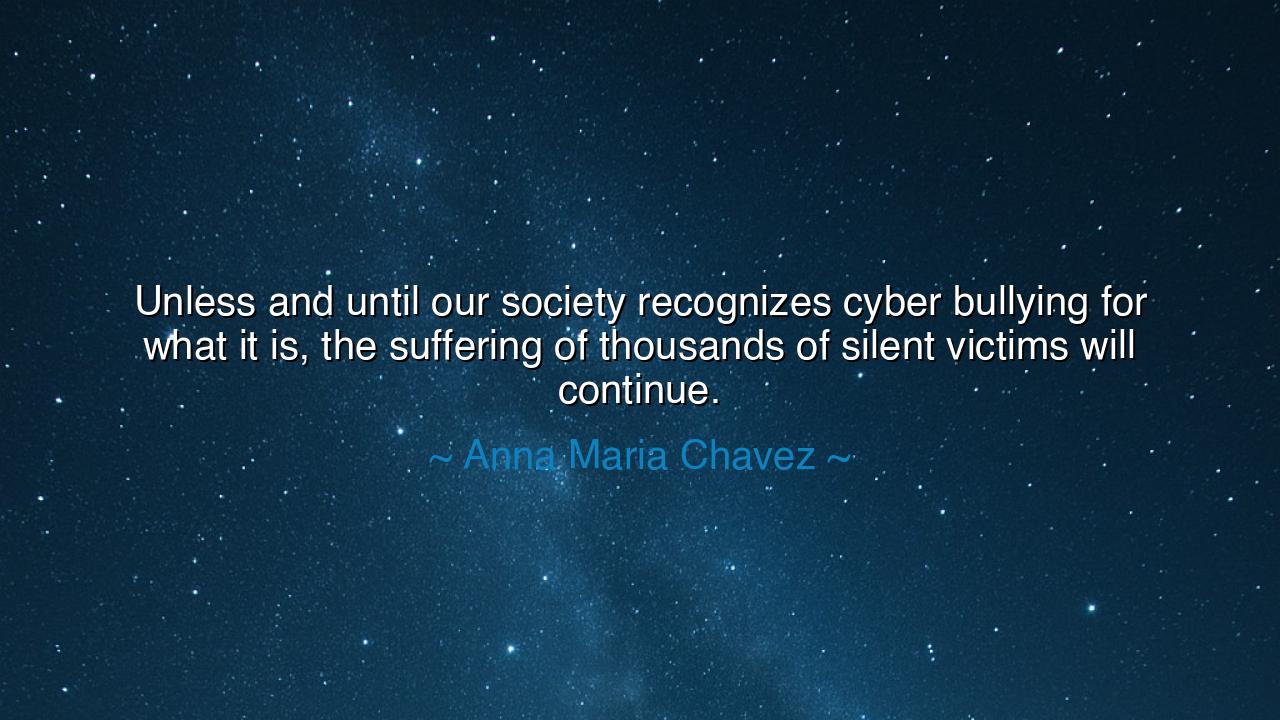
Unless and until our society recognizes cyber bullying for what
Unless and until our society recognizes cyber bullying for what it is, the suffering of thousands of silent victims will continue.






Hear the urgent voice of Anna Maria Chavez, who declared: “Unless and until our society recognizes cyber bullying for what it is, the suffering of thousands of silent victims will continue.” In this saying, she calls us to awaken from slumber, to see the invisible wounds inflicted not by fists or swords, but by words, screens, and shadows cast across the digital realm. For though the battlefield has shifted, the pain is no less real; though the weapon is unseen, its strike pierces the heart with unrelenting force.
The ancients spoke often of the power of the tongue, that small flame which could set entire forests ablaze. In our age, the tongue has grown wings; through the vastness of the internet, it reaches farther, strikes faster, and multiplies its sting. Cyber bullying is the new mask of an ancient cruelty: the desire to wound the weak, to mock the different, to silence the vulnerable. Chavez’s wisdom warns us that if society refuses to name this evil, the cries of its victims will remain unheard, hidden beneath the noise of indifference.
Consider the tragic story of Amanda Todd, a young girl from Canada whose life was consumed by relentless online torment. Mocked, shamed, and pursued even into the supposed safety of her own home, she carried a burden too heavy for her spirit. Though she cried out through videos and writings, the world was slow to listen. Her death became a lamentation and a call to arms, reminding us that words, when hurled like stones, can destroy as surely as any weapon. Here we see Chavez’s prophecy: where recognition is absent, suffering thrives.
Yet, in this darkness, there is hope. When communities rise to recognize the truth—that online cruelty is as destructive as physical harm—they begin to forge defenses. Schools, families, and nations that name cyber bullying for the evil it is can create sanctuaries of healing. Awareness births accountability; accountability births change. As the ancients said, to name a thing is to bring it into the light, and in the light, shadows lose their power.
The lesson is clear: silence is complicity. To dismiss online cruelty as trivial is to abandon the young and the voiceless to unseen torment. Society must embrace the duty to speak for the silent, to build systems of compassion and justice in the digital age. We must teach that the screen does not absolve responsibility, that every word carries the weight of consequence, and that dignity is sacred both in the physical world and in the virtual.
Therefore, O listener, take this charge: guard your speech, whether spoken aloud or written in pixels. Stand as a shield for those mocked and belittled. Confront cruelty, whether in your home, your community, or upon the boundless fields of the internet. Teach the young not only how to wield technology, but how to honor humanity within it. For to remain indifferent is to allow the chain of silent suffering to continue unbroken.
And so, let Chavez’s words resound like a bell of warning: “Unless and until our society recognizes cyber bullying for what it is, the suffering of thousands of silent victims will continue.” Let us be the generation that names the wound, heals the broken, and builds a world where technology serves not to wound, but to uplift. Only then will silence give way to hope, and victims become victors in the light of recognition and compassion.






AAdministratorAdministrator
Welcome, honored guests. Please leave a comment, we will respond soon